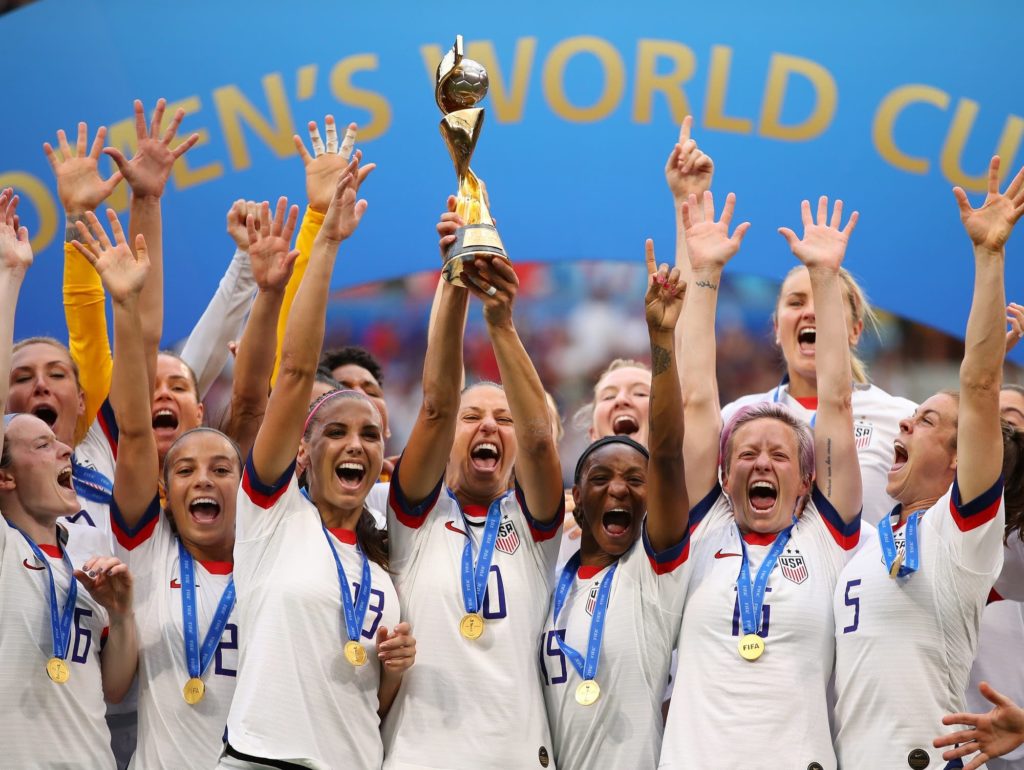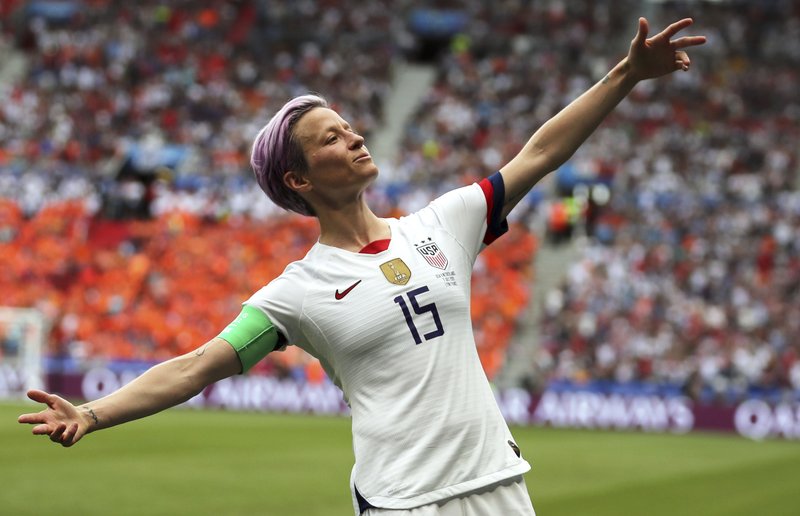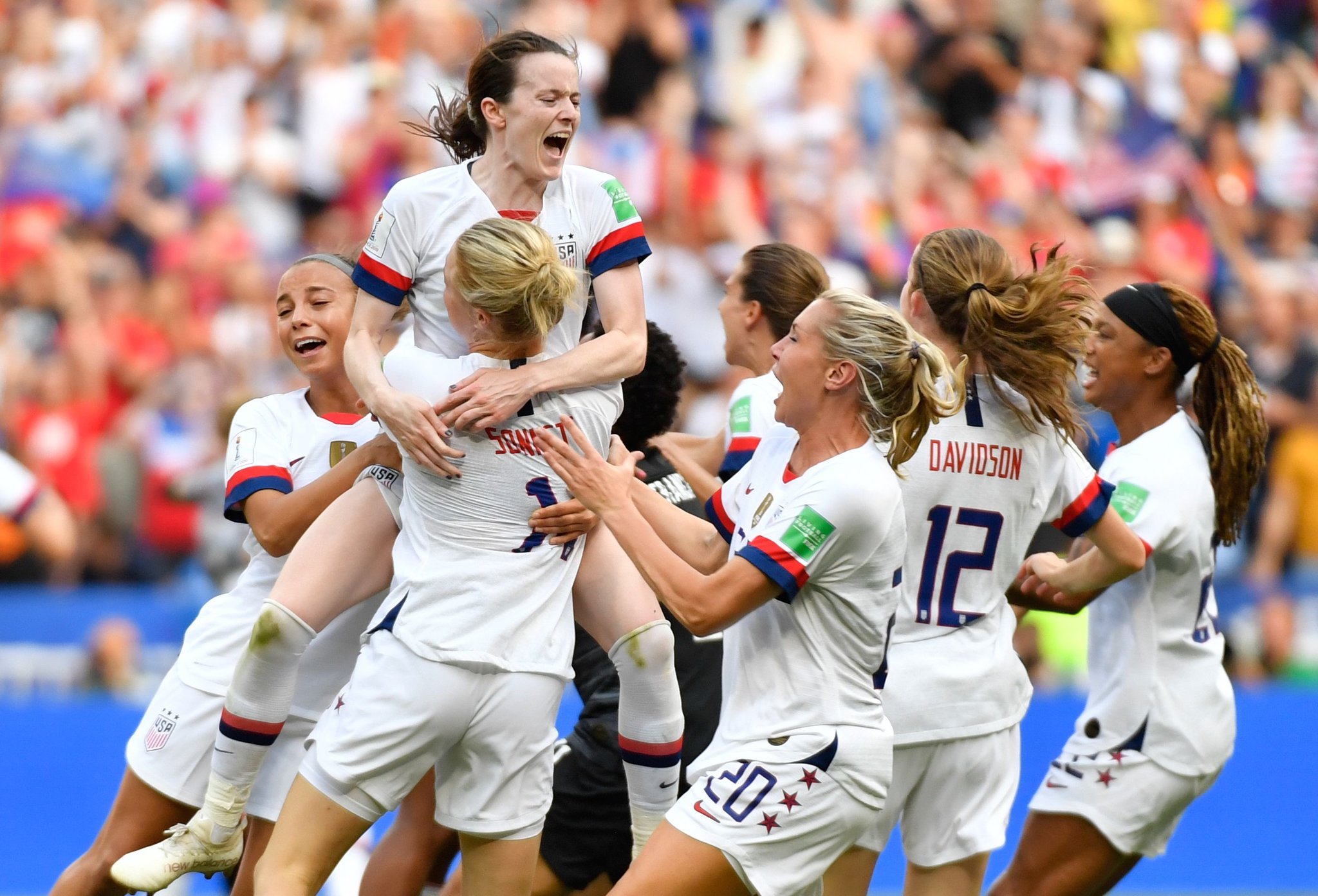
Dominating yet another opponent in yet another final, the United States women’s soccer team claimed its fourth Women’s World Cup title on Sunday, beating the Netherlands, 2-0, in Lyon, France, to repeat as world champions.
Megan Rapinoe and Rose Lavelle scored second-half goals for the United States, which needed more than an hour to solve a tenacious Netherlands defense but eventually, rush after rush, found a way through. Rapinoe broke the dam with a penalty kick in the 61st minute, and Lavelle sealed the victory with a driving run up the center in the 69th.
“It’s surreal,” said Rapinoe, who was named the tournament’s outstanding player. “I don’t know how to feel. It’s ridiculous.”
It was the second straight World Cup title for a dozen of the American players, who claimed their first championship in Canada four years ago. It also cemented their status as the gold standard in women’s soccer, even as Europe — led by teams like the Netherlands — mounts a sustained assault on their crown.
The tears flowed freely after the win: from striker Alex Morgan, who tied for the tournament lead with six goals; from defender Kelley O’Hara, who was forced from the game at halftime after a scary head-to-head collision; and from the Dutch, who fought the Americans harder, and kept even with them longer, than any team at this World Cup.

The Netherlands was the only team to keep the United States off the scoreboard in the first half in France but like all the other teams before them — Thailand, Chile, Sweden, Spain, France and England — they could not hold off the Americans forever.
“They put their heart and soul into this journey, and I can’t thank them enough,” United States Coach Jill Ellis, hoarse and on the verge of tears herself, said minutes after the game. Ellis became the first coach to win consecutive Women’s World Cup titles; her team has not lost a game in the event since 2011 (13-0-1), and will be favored to reclaim its Olympic championship next summer in Tokyo.
Plans were already underway, team officials said, for a parade and celebration of the team’s championship in New York sometime this week.
After the team received their winner’s medals from dignitaries that included FIFA’s president, Gianni Infantino, and France’s president, Emmanuel Macron, the World Cup trophy was raised into a cloud of gold and blue confetti by Carli Lloyd, the 36-year-old who starred in the 2015 triumph but was reduced to a bit player long before she entered Sunday’s final as a late substitute. Lloyd’s status showed her to be the latest example of a star nudged aside by progress, a victim of the seemingly endless stream of great American players who have driven the program forward for a generation, but her reduced role did nothing to diminish her joy — or that of her teammates, who were soon making snow angels in the fallen confetti as they lingered on the podium.
The Americans won the first World Cup in 1991 in China, then took the second in a transformational 1999 tournament on home soil. For decades, the team and its stars have been leaders in the fight to grow the women’s game, and to ensure more resources — and more money — flow to those to compete in it. The current team sued its own federation for gender discrimination earlier this year, part of a longrunning fight for pay equity from U.S. Soccer, but never blinked in its quest to win another world title only a few months later.
Those concurrent campaigns, perhaps more than anything, defined how the United States team in its current form has been a social force as much as a sporting one: that the pro-American crowd inside the Stade de Lyon on Sunday chanted “Equal Pay!” as the game ended was no accident. That the Americans were celebrating another championship at the time was not, either.

Rapinoe’s opening goal came after Morgan was kicked in the shoulder by Netherlands defender Stefanie van der Gragt in the penalty area, a rare loss of composure by the Dutch team. Rapinoe, Ellis’s preferred penalty taker, calmly stepped up and buried her attempt to the right of goalkeeper Sari van Veenendaal, who barely moved as the ball rippled the back of the net.
It was appropriate, somehow, that the goal was set up after a short break for a video-assistant review, the replay system that was a source of consternation throughout the tournament. The referee, Stephanie Frappart of France, had missed the initial foul that created the penalty; alerted by a review official, she took a second look on a sideline television and promptly whistled a foul, and a penalty kick. It was the 33rd video review of the tournament, and the 29th time the second look changed a decision on the field.
Stymied for an hour, the Americans — who had been among those who had pressed for the use of the system — were suddenly in front. When Lavelle’s charge up the middle, turning a backpedaling defender and firing a hard, low shot, provided an insurance goal minutes later, there was a sense — even with 20 minutes to play — that the Americans’ latest title was secure.
Van Veenedaal, who almost single-handedly kept the game scoreless in the first half with several diving, sprawling saves, was named the tournament’s outstanding goalkeeper. Rapinoe, whose World Cup included a brief social-media fight with President Trump after a video of her emerged saying that she would not visit the White House if her team claimed the trophy, won the Golden Boot as the top scorer as well as the Golden Ball as the tournament’s outstanding player.

